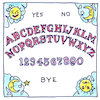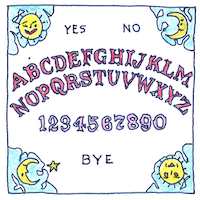William Benjamin Carpenter,
Michael Faraday,
James Braid,
Michel Eugène Chevreul
behavioral science

|
Ideomotor phenomenon
William Benjamin Carpenter debunked psychics and spiritualists, claiming they were responsible for any paranormal manifestations they claimed even if they were not conscious of their role. James Braid related this to hypnosis, in which instruction may be given to muscles without conscious awareness or agreement. Michael Faraday showed that subconscious pressures exerted by the people who were touching the table, not paranormal phenomena, caused table-turning. Michel Eugène Chevreul explained involuntary and subconscious muscular reactions are responsible for the movements of magic pendulums, divining rods, and table-turning.
Ouija
Who is it? I . . . T . . . S O . . . N . . . L . . . Y U . . . S
Knee-jerk reactions
I know evidence of past performance doesn’t support my hopes for the team, political candidate, negotiator; however, I’m willing to give them a chance. I personally saw a man find water for a well using a forked wand of willow. It doesn’t matter to me if scientists say there’s nothing to it. I agree it’s not probable anyone can channel an entity living out of time, but she believes she’s not just making it up, so I listen to what she says. When we asked, the Ouija board pointed to the right answers. Yes, it rained yesterday; yes, there’s an afterworld. OK, let’s accept for now you don’t believe in UFOs, but just you wait until you see one, then you’ll believe.



Anyone may unconsciously influence, without a willful purpose, tables, pendulums, rods, and planchettes on ouija boards. This ability does not presume any special connection to a spiritual world. The unconscious might be worth listening to, but there’s no way to predict its relationship with shared reality.
See also in The book of science:
Readings in wikipedia: